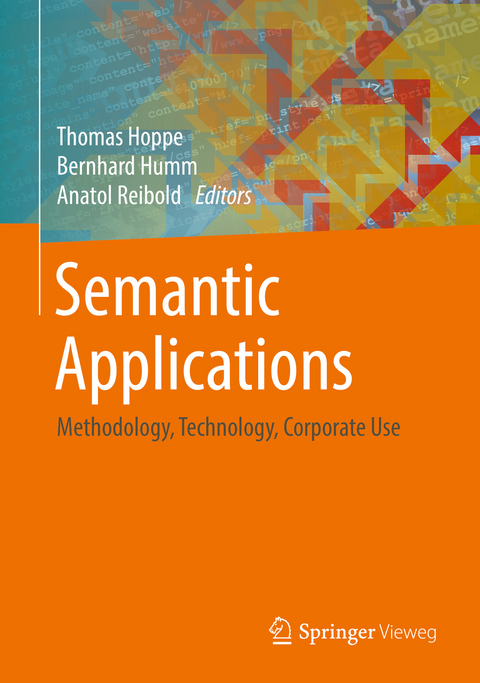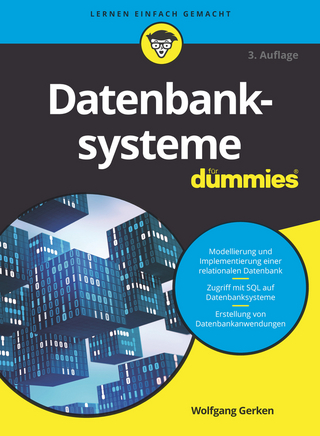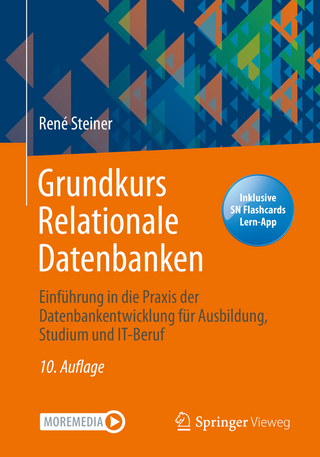
Semantic Applications
Springer Berlin (Verlag)
978-3-662-55432-6 (ISBN)
This book describes methodologies for developing semantic applications. Semantic applications are software applications which explicitly or implicitly use the semantics, i.e. the meaning of a domain terminology, in order to improve usability, correctness, and completeness. An example is semantic search, where synonyms and related terms are used for enriching the results of a simple text-based search. Ontologies, thesauri or controlled vocabularies are the centerpiece of semantic applications.
The book includes technological and architectural best practices for corporate use. The authors are experts from industry and academia with experience in developing semantic applications.
Thomas Hoppe works as Data Scientist and Knowledge Engineer. He is lecturer for information systems, content management, data- and text mining and search technology at the Computer Science Department of the Hochschule für Technik und Wirtschaft Berlin - University of Applied Sciences, Germany. He received his doctorate from the University of Dortmund (now Technical University Dortmund) and the degree Dipl.-Inform. from the Technical University Berlin, Germany. His research interests are focused around the application of Bayesian Approaches, Data and Text Mining, Machine Learning, Knowledge Representation, Knowledge Engineering, Search Engines and Semantic Technologies in industrial and commercial settings. He founded 2008 together with three associates the Ontonym GmbH for the development and commercialization of semantic applications, which he led as CEO until 2015. 2014 he founded the Datenlabor Berlin for the purpose of developing customer specific data products for SMEs and for quality assurance and certification of semantic applications and predictive models. Before this self-employement he worked for 18 years as research scientist and project manager at the Technical University Berlin and T-Systems, where he also developed two patents in the field of search engines.Bernhard G. Humm is a professor for software engineering and project management at the Computer Science Department of Hochschule Darmstadt – University of Applied Sciences, Germany. He received a Ph.D. from the University of Wollongong, Australia and the degree Dipl.-Inform. from Kaiserslautern University, Germany. His research focus is on applied artificial intelligence, software architecture, and programming languages. He is member of the board of directors of the institute of applied informatics, Darmstadt (aIDa) and Ph.D. coordinator. He is running several national and international research projects in co-operation with industry and research organizations and publishes his results regularly. Before re-entering university, he worked in the IT industry for 11 years as a software architect, chief consultant, IT manager and head of the research department of a large software company in Germany.Anatol Reibold studied mathematics and mechanics at the university Novosibirsk. Passionate mathematician with strong interest in Data Science, Big Data, Data Analysis, Data Mining, Ontologies, Semantic Web, Information Science, Modeling, GABEK, DRAKON, Polycontextural Logic, Polyductive Theory. Now the Chief Data Science Officer of OntoPort UG.
Introduction.- Ontology Development.- Compliance using Metadata.- Variety Management for Big Data.- Text Mining in Economics.- Generation of Natural Language Texts.- Sentiment Analysis.- Building Concise Text Corpora from Web Contents.- Ontology-Based Modelling of Web Content.- Personalized Clinical Decision Support for Cancer Care.- Applications of Temporal Conceptual Semantic Systems.- Context-Aware Documentation in the Smart Factory.- Knowledge-Based Production Planning for Industry 4.0.- Information Exchange in Jurisdiction.- Supporting Automated License Clearing.- Managing cultural assets: Implementing typical cultural heritage archive's usage scenarios via Semantic Web technologies.- Semantic Applications for Process Management.- Domain-Specific Semantic Search Applications.
| Erscheinungsdatum | 06.05.2018 |
|---|---|
| Zusatzinfo | XXV, 264 p. 130 illus., 114 illus. in color. |
| Verlagsort | Berlin |
| Sprache | englisch |
| Maße | 168 x 240 mm |
| Gewicht | 678 g |
| Themenwelt | Mathematik / Informatik ► Informatik ► Datenbanken |
| Schlagworte | Artificial Intelligence • artificial intelligence (incl. robotics) • Big Data • business applications • Computer Science • Corporate Semantic Web • Corporate Use • Data Integration and ETL • development of semantic applications • e-Business/e-Commerce • E-commerce: business aspects • e-commerce/e-business • Expert systems / knowledge-based systems • Industry 4.0 • Information Retrieval • information systems applications (incl. internet) • Internet Searching • Legal Technologies • Metadata • Methodology • Natural Language Texts • Ontologies • ontology engineering • Quality management • Reasoning • Robotics • semantic applications • semantic search • semantic web • Smart Factory • Special purpose and application-based systems • Technology • Text Mining |
| ISBN-10 | 3-662-55432-1 / 3662554321 |
| ISBN-13 | 978-3-662-55432-6 / 9783662554326 |
| Zustand | Neuware |
| Haben Sie eine Frage zum Produkt? |
aus dem Bereich


